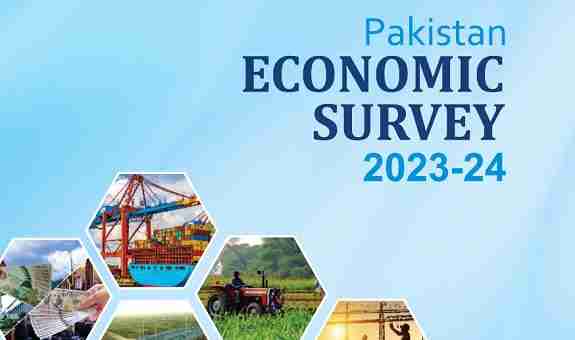PkRevenue.com – Pakistan on Tuesday launched the Economic Survey 2023-24, revealing that the country missed most of its economic targets for the outgoing fiscal year.
The provisional figures from the survey show that Pakistan’s growth target of 3.5% was not met, with the country posting a growth figure of just 2.4%. However, Federal Minister for Finance and Revenue Muhammad Aurangzeb maintained that the path to stability is ongoing while launching the economic survey.
Despite an improved performance by the agriculture sector, Pakistan’s industries and services sectors registered subdued growth of 1.2%. Reflecting on the previous fiscal year’s challenges, Aurangzeb said, “In FY22-23, our GDP contracted by 0.2%, while the PKR depreciated by 29%, and our foreign exchange reserves dwindled to just two weeks of import cover.”
The survey also highlights the challenges faced by Pakistan’s economy, which has been struggling with high inflation, rising debt, and a depreciating currency. Aurangzeb, while unveiling the Economic Survey 2023-24, reiterated his commitment to economic reforms, stating that there are “no sacred cows” when it comes to contributing to Pakistan’s economy. He emphasized that there is no such thing as a strategic state-owned enterprise (SOE), despite reports suggesting the government is looking to privatize all entities except those with strategic importance.
Aurangzeb’s remarks come as Pakistan aggressively pursues a privatization program, which is also being advocated by the International Monetary Fund (IMF). Speaking on the IMF, Aurangzeb said that Pakistan’s Stand-By Arrangement (SBA), which concluded in April, had a positive impact on the economy. “Even when I was in the private sector, I was clear that we should enter a program with the IMF. There was no ‘Plan B’. If the nine-month SBA had not been achieved, we would have been in a very different situation,” he said. He added that Pakistan is currently engaged in talks for a longer, larger program with the IMF, with discussions set to continue virtually.
The finance minister highlighted that Pakistan’s Large Scale Manufacturing (LSM) sector was adversely affected due to high-interest rates and energy prices. However, he praised the agriculture sector, calling it a “savior” and a significant lever of growth moving forward. During the fiscal year 2023-24, the Federal Board of Revenue’s (FBR) tax collection grew by nearly 30%, which Aurangzeb described as “almost unprecedented.”
Aurangzeb projected Pakistan’s current account balance to be in surplus in May, attributing this to the government’s administrative measures that helped stabilize the currency. “Foreign exchange reserves improved to over $9 billion. Full credit to the central bank. Our reserves are not funded by the debt stock,” he said. He also noted that inflation had decreased from 38% in May 2023 to 11% in May 2024, leading the central bank to cut the policy rate.
The finance minister pointed out that foreign investment in Pakistan’s stock market indicates confidence in the country’s economic direction. He stressed the need to increase the tax-to-GDP ratio and reiterated that “there are no sacred cows when it comes to taxation. Everyone has to contribute to the economy,” ahead of presenting the government’s budget proposals in the National Assembly.
The Economic Survey 2023-24 thus paints a mixed picture, highlighting areas of concern while also pointing to signs of progress and stabilization in Pakistan’s economy.
